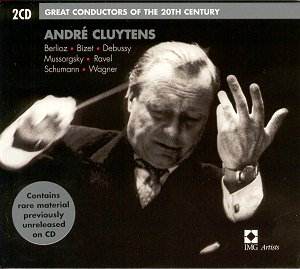The 'Great Composers of the 20th Century' series is
a joint project between IMG Artists and EMI Classics. If the first issues
are anything to go by, the enterprise is well worthwhile, and this two
disc set of André Cluytens conducting various orchestras contains
some real gems.
Cluytens conducts a variety of orchestras with whom
he was closely associated at the height of his career: the leading French
ensembles, of course, in addition to the Philharmonia and the Berlin
Philharmonic. The sound may differ markedly from one performance to
the next, but is never less than satisfactory, and sometimes it is a
good deal better than that.
With the Philharmonia Orchestra in 1958 Cluytens conducted
a vibrant interpretation of Ravel's La Valse, at London's Kingsway
Hall. A noted conductor of this composer's music, his performance is
brightly lit and particularly exciting, with some wonderfully expressive
and supremely Gallic phrasing.
The most recent of the recordings were made with the
Orchestre de la Société des Concerts du Conservatoire,
in 1963 and 1964. Debussy's three orchestral Images are wonderfully
poised, within the context of a most pleasing acoustic and sound spectrum,
recorded in the Salle Wagram, Paris. The Conservatoire Orchestra was
at that time a major ensemble, associated with that organisation's prestigious
concert promotions rather than a student group. Both here and in the
live recording of Berlioz's Symphonie Fantastique, from Tokyo
in 1964, there is the feeling of a special occasion, of artistry which
brings a particularly keen focus on the music. There is an earlier,
1955 studio, recording of the Fantastique (Testament SBT1234),
but this live version probably has the edge, being well recorded and
particularly expressive.
A couple of items from the German repertory represent
Cluytens' interest in that sphere. We should not forget that he recorded
a distinguished cycle of the Beethoven symphonies with the Berlin Philharmonic,
which were for many years a staple of the Classics for Pleasure catalogue.
That orchestra is briefly heard amongst this collection, in Schumann's
Manfred Overture, and a very good performance it is too. The
orchestral details are well illuminated, the textures delicately yet
purposefully handled. And in Wagner's Act II Prelude from Lohengrin,
although the orchestra is French (that of the Paris Opéra), the
conception remains thoroughly idiomatic, even though the sound is less
well structured than elsewhere in the set.
There is a major operatic scene on offer, too. It features
the remarkable voice of Boris Christoff as Mussorgsky's troubled hero
in the Coronation Scene from Boris Godunov. Perhaps the
added bell sounds which precede the music proper seem frankly 'over
the top', but there is nothing wrong with the performance itself. Cluytens
was an experienced hand in the opera house, and it shows, since everything
feels absolutely in its right place, and the phrasing allows both the
solo and the choral parts to make their mark.
The collection opens with a delightfully pointed account
of Bizet's Symphony in C, recorded as early as 1953, a few years before
EMI's other famous interpretation with the same French Radio Orchestra,
conducted by Sir Thomas Beecham. Cluytens is Beecham's match in this
piece, although the recording is perhaps a little less sophisticated,
being a little older and based on mono tapes. Whatever the details of
the sound, however, the music is not compromised and the results remain
pleasing, with some wonderfully elegant touches.
The booklet contains a thoughtful and well researched
essay by Robert Layton, outlining and evaluating both Cluytens' career
and the choices of music gathered to form the set. For this is a most
worthwhile collection of performances by a conductor whose musical achievement
was considerable and will be fondly remembered by all who have encountered
it.
Terry Barfoot


